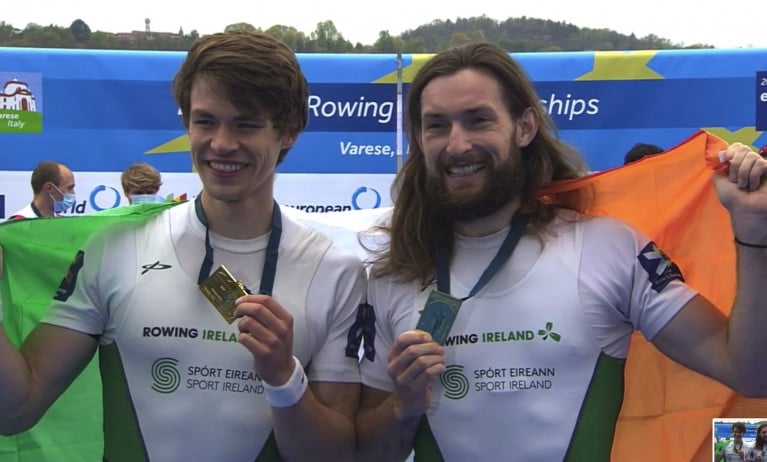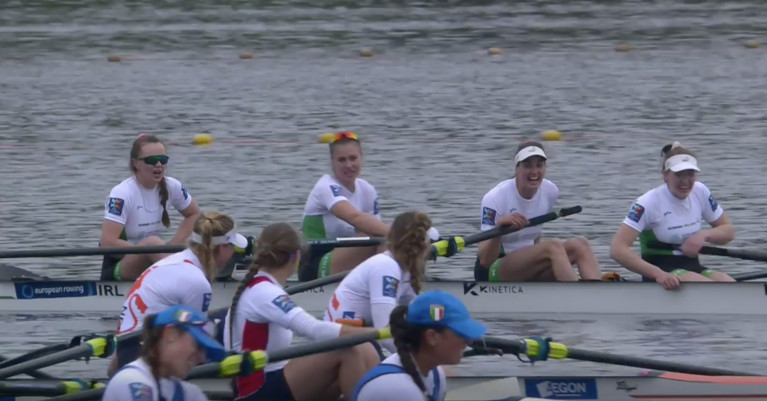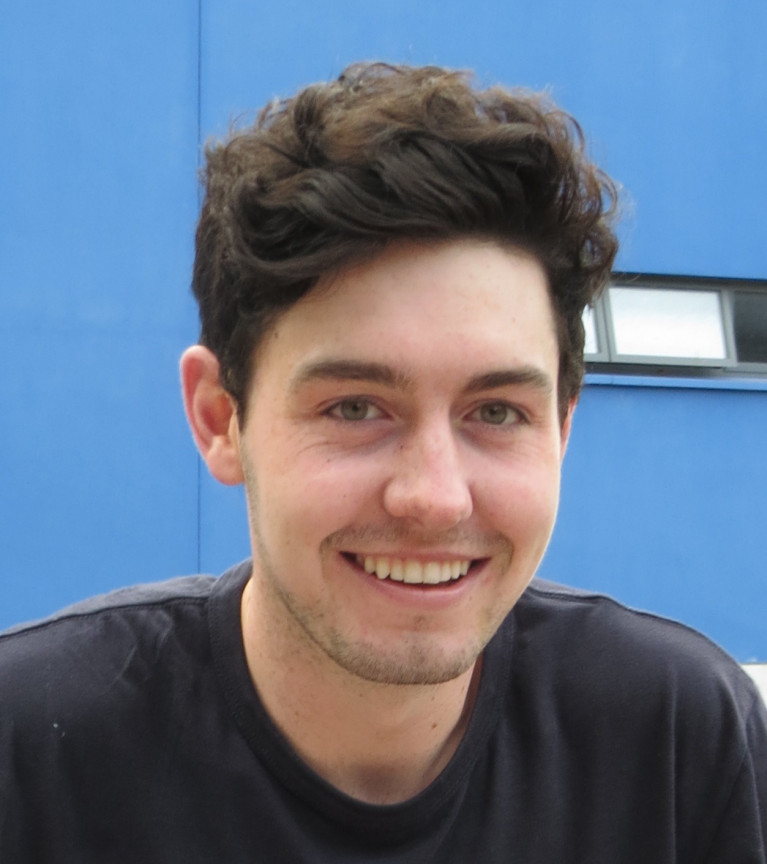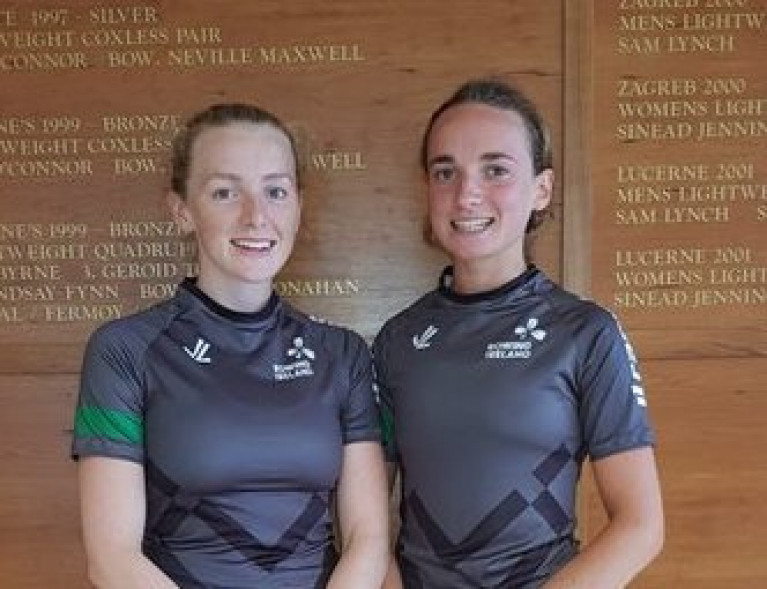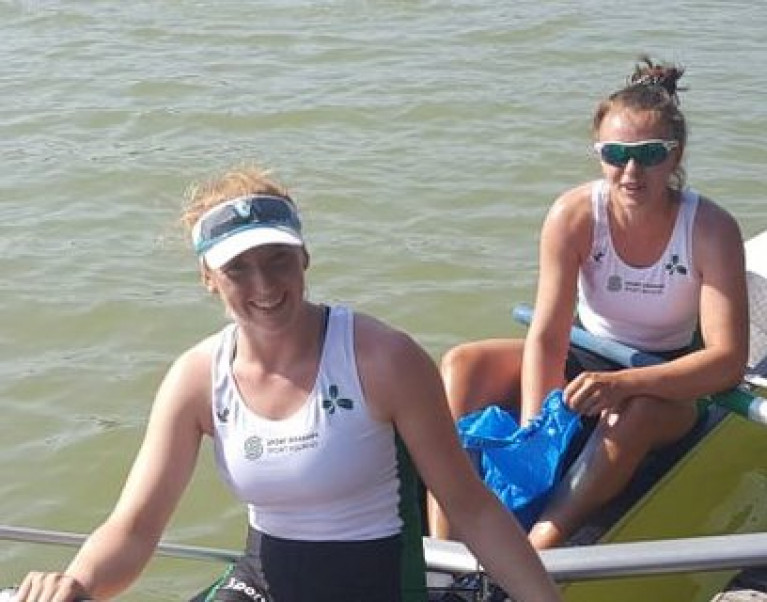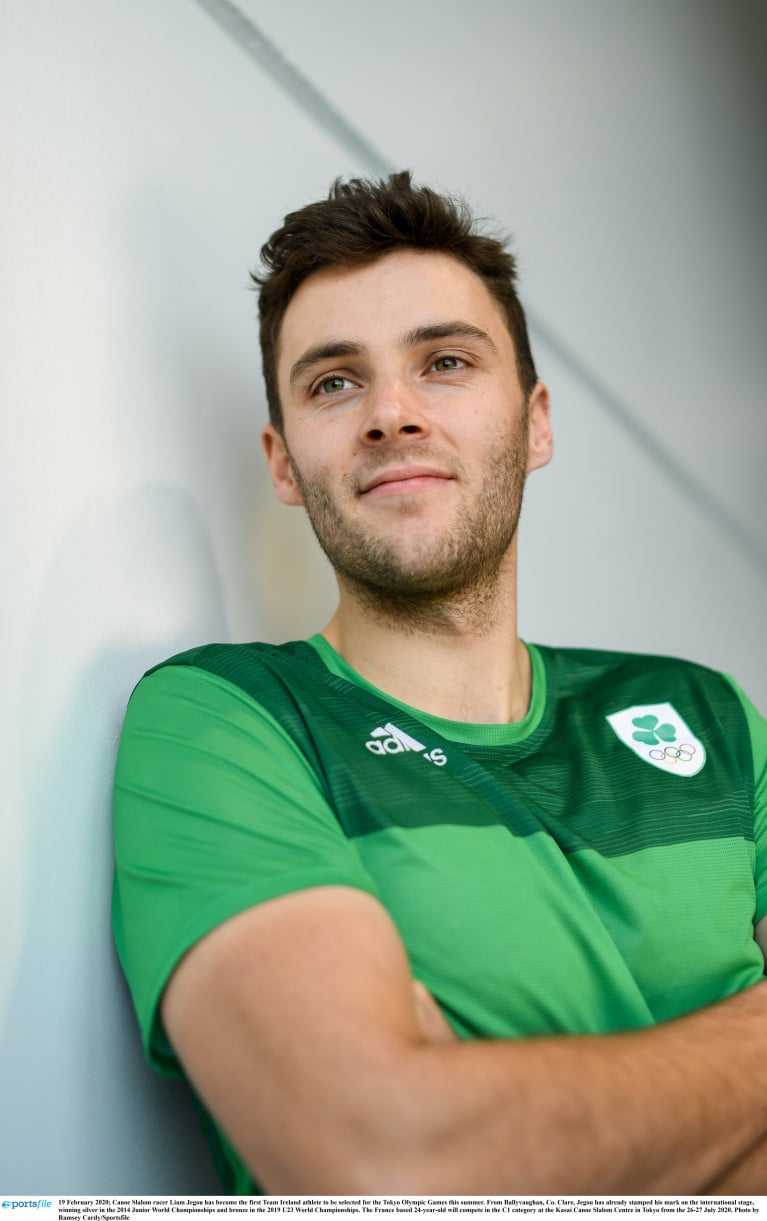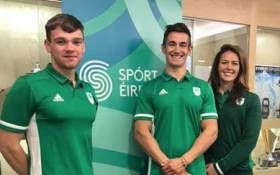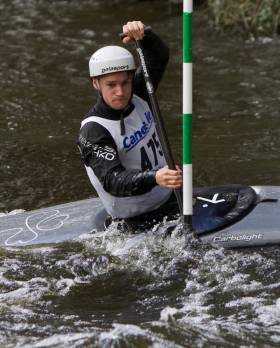Displaying items by tag: Ireland
Gold for O'Donovan and McCarthy at European Rowing Championships
Paul O’Donovan and Fintan McCarthy won gold for Ireland at the European Rowing Championships today in Italy, adding to an excellent silver for the women’s four earlier.
The Ireland lightweight double saw off a spirited display by Germany, who led early on. Ireland moved decisively through the middle stages and took over the lead at 1300 metres. They then sprinted through the final few hundred metres to win by a length from Germany, with Italy third.
“It was a decent race, it’s good to be back,” O’Donovan said. “I was off last season so Fintan raced in the single last year. Fintan is just dragging me along in the double. We need bigger biceps. We’re gonna work on some curls which will see us through to the end of the summer.”
The Ireland women’s four looked impressive as they took silver in Varese.
The crew of Aifric Keogh, Eimear Lambe, Fiona Murtagh and Emily Hegarty raced so well that they pushed up very close to the Netherlands in a push for gold.
The new Irish combination started slowly, but slotted into the leading trio of the Dutch, British and Irish. In the third quarter the Ireland four pushed through Britain and then tested the Dutch coming to the line.
Britain, with Rebecca Shorten of Northern Ireland in the stroke seat, took bronze.
Keogh said: “The medal this year means a lot to us because were so close to Olympic qualification. A lot of crews from Ireland are already qualified, and for us to be able to finish that close to the Dutch is a really huge confidence boost.”
Earlier, the women’s pair of Aileen Crowley and Monika Dukarska showed well in the early stages of their A Final, but in a hot race they were pushed back to sixth at the finish. Britain’s Helen Glover and Polly Swann justified their favouritism to race to gold – but they were given a battle by Romania, while Spain took the bronze.
The racy lightweight double scull of Aoife Casey and Margaret Cremen gave a good performance in a superb final. Italy were the surprise winners from Britain and the Netherlands, with Ireland taking fifth.
Gary O’Donovan had to settle for fourth in his A Final of the lightweight single sculls. The race belonged to Peter Galambos of Hungary: he led through all four quarters. O’Donovan made ground in the closing stages, but was 4.3 seconds off Galambos at the finish.
Lydia Heaphy got off to a great start in the lightweight women’s single and led early on. However, Alena Furman of Belarus moved swiftly into the lead and stretched it down much of the course to win gold. Heaphy finished sixth.
Enniskillen woman Holly Nixon teamed up in the Britain double with Saskia Budgett to take a bronze medal in a race won by Romania.
European Rowing Championships, Varese, Italy, Day Three (Irish interest)
Men
Double Sculls – B Final (Places 7 to 12): 1 Ireland (R Byrne, P Doyle) 6:21.47, 2 Italy 6:22.52, 3 Germany 6:23.29.
Single Sculls – C Final (Places 13 to 18): 1 Russia 7:08.08, 2 Ireland (D Lynch) 7:09.01.
Lightweight Double – A Final: 1 Ireland (F McCarthy, P O’Donovan) 6:18.14, 2 Germany 6:19.94, 3 Italy 6:21.05.
Lightweight Single Sculls – A Final: 1 Hungary (P Galambos) 7:01.52; 4 Ireland (G O’Donovan) 7:05.82.
Women
Four – A Final: 1 Netherlands 6:27.51, 2 Ireland (A Keogh, E Lambe, F Murtagh, E Hegarty) 6:27.96, 3 Britain (4 R Shorten) 6:31.27.
Pair – A Final: 1 Britain 7:02.73; 6 Ireland (A Crowley, M Dukarska) 7:11.83.
Double Sculls – A Final: 3 Britain (1 H Nixon) 6:55.13.
Lightweight Double – A Final: 1 Italy 6:58.66, 2 Britain 6:59.56, 3 The Netherlands 7:01.13; 5 Ireland (A Casey, M Cremen) 7:07.42.
Lightweight Single Sculls – A Final: 1 Belarus (A Furman) 7:41.81; 6 Ireland (L Heaphy) 7:58.70.
Ireland Women's Four Take European Silver
The Ireland women’s four took a wonderful silver medal at the European Rowing Championships in Varese, Italy, today.
The crew of Aifric Keogh, Eimear Lambe, Fiona Murtagh and Emily Hegarty raced so well that they pushed up very close to the Netherlands in a push for gold.
The new Irish combination started slowly, but slotted into the leading trio of the Dutch, British and Irish. In the third quarter the Ireland four pushed through Britain and then tested the Dutch coming to the line.
Britain, with Rebecca Shorten of Northern Ireland in the stroke seat, took bronze.
Earlier, the women’s pair of Aileen Crowley and Monika Dukarska showed well in the early stages of their A Final, but in a hot race they were pushed back to sixth at the finish. Britain’s Helen Glover and Polly Swann justified their favouritism to race to gold – but they were given a battle by Romania, while Spain took the bronze.
Gary O’Donovan had to settle for fourth in his A Final of the lightweight single sculls. The race belonged to Peter Galambos of Hungary: he led through all four quarters. O’Donovan made ground in the closing stages, but was 4.3 seconds off Galambos at the finish.
Lydia Heaphy got off to a great start in the lightweight women’s single and led early on. However, Alena Furman of Belarus moved swiftly into the lead and stretched it down much of the course to win gold. Heaphy finished sixth.
Enniskillen woman Holly Nixon teamed up in the Britain double with Saskia Budgett to take a bronze medal in a race won by Romania.
European Rowing Championships, Varese, Italy, Day Three (Irish interest)
Men
Double Sculls – B Final (Places 7 to 12): 1 Ireland (R Byrne, P Doyle) 6:21.47, 2 Italy 6:22.52, 3 Germany 6:23.29.
Single Sculls – C Final (Places 13 to 18): 1 Russia 7:08.08, 2 Ireland (D Lynch) 7:09.01.
Lightweight Single Sculls – A Final: 1 Hungary (P Galambos) 7:01.52; 4 Ireland (G O’Donovan) 7:05.82.
Women
Four – A Final: 1 Netherlands 6:27.51, 2 Ireland (A Keogh, E Lambe, F Murtagh, E Hegarty) 6:27.96, 3 Britain (4 R Shorten) 6:31.27.
Pair – A Final: 1 Britain 7:02.73; 6 Ireland (A Crowley, M Dukarska) 7:11.83.
Double Sculls – A Final: 3 Britain (1 H Nixon) 6:55.13.
Lightweight Single Sculls – A Final: 1 Belarus (A Furman) 7:41.81; 6 Ireland (L Heaphy) 7:58.70.
Ireland Double Wins B Final at European Championships
On a day of promise for Ireland in A Finals of the European Rowing Championships, Ireland’s Philip Doyle and Ronan Byrne finished their campaign with a fine win in the B final of the double sculls.
Italy set the early pace in Varese, with Ireland and Germany closely tracking them through the middle and later stages. Doyle and Byrne produced a good sprint finish to win. This places them seventh overall.
The C Final was won by Norway’s Kris Brun and Are Strandli. The lightweight crew, which finished third at Rio 2016, campaigned in the open weight class at this event.
Daire Lynch finished his campaign in the single sculls quite well. He took a close-up second in the C Final behind impressive Russian sculler Nikolay Pimenov, who led down the course from the start. Lynch, who pushed hard at the end, places 14th overall at the Championships in a very tough event.
European Rowing Championships, Varese, Italy, Day Three (Irish interest)
Men
Double Sculls – B Final (Places 7 to 12): 1 Ireland (R Byrne, P Doyle) 6:21.47, 2 Italy 6:22.52, 3 Germany 6:23.29.
Single Sculls – C Final (Places 13 to 18): 1 Russia 7:08.08, 2 Ireland (D Lynch) 7:09.01.
Two superb performances by lightweight doubles got Ireland off to an excellent start on day two of the European Rowing Championships in Varese today.
The men’s crew of Paul O’Donovan and Fintan McCarthy would go on to have a great win in their semi-final, but Aoife Casey and Margaret Cremen deserve the plaudits for taking second in their semi-final.
This crew is aimed at the Olympic Qualification regatta next month in Lucerne and looked to be an outside bet initially. Their performances at this regatta changed that.
In today’s semi, they showed great maturity. Italy took over early and were never headed, while Russia and Ireland tracked them in second and third. But the final quarter Ireland pushed through into a firm second place.
Cremen and Casey take their place in the A Final on Sunday. The other semi-final, won by Britain from the Netherlands, looked stronger, but Ireland even have an outside chance of a medal.
McCarthy and O’Donovan were favourites for gold right from the start. Doubts, if there were some, related to the ability of the 2019 World Champions to turn it on again after effectively missing the 2020 season, such as it was.
They had a real test in Italy, who led early and might have expected another battle in the closing stages. It never happened. Coming up to halfway, McCarthy and O’Donovan zoomed past the men in blue. They opened up the lead to clearwater and won.
Germany, who won the other semi-final, will contend on Sunday. However, their winning time was slower than the Irish today.
The Ireland double of Philip Doyle and Ronan Byrne were well off the pace in their semi-final and finished sixth. France, Britain and Switzerland got off to good starts and duly took the A Final places. Ireland had a poor start. They tried to move into contention in the middle stages but could not get a hold on the contest.
Daire Lynch qualified for the C Final (places 13 to 18) of the men’s single sculls, taking second in his semi-final.
European Rowing Championships, Varese, Italy – Day Two (Irish interest)
Men
Double Sculls – A/B Semi-Final (First Three to A Final; rest to B Final): 1 France 6:10.26, 2 Britain 6:11.17, 3 Switzerland 6:12.79; 6 Ireland (P Doyle, R Byrne) 6:21.38.
Lightweight Double Sculls – A/B Semi-Final (First Three to A Final; rest to B Final): 1 Ireland (F McCarthy, P O’Donovan) 6:22.74, 2 Italy 6:25.53, 3 Czech Republic 6:27.14.
Single Sculls – C/D Semi-Final Two (First Three to C Final; rest to D Final): 2 Ireland (D Lynch) 7:02.22.
Women
Lightweight Double Sculls – A/B Semi-Final (First Three to A Final; rest to B Final): 1 Italy 7:11.44, 2 Ireland (A Casey, M Cremen) 7:14.44, 3 Russia 7:15.46.
Women's Four and Lightweight Double Provide Highlights on Good First Day for Irish UPDATE
Ireland’s good first day at the European Rowing Championships in Varese, Italy, was all the better because two crews targeting qualification next month for Tokyo did the business.
Of the eight Ireland crews competing, the rejigged women’s four were the dark horses. Well, no more. Only by winning their heat would they qualify for the A Final. This was pressure for what is a new formation, but Aifric Keogh, Eimear Lambe, Fiona Murtagh and Emily Hegarty showed none of it. Russia led early, but Ireland took over with good speed in the middle stages and won well – in the faster time of the two heats. The Netherlands, who won the first heat from Britain, are likely to be hunting medals alongside the Irish and British on Sunday.
The lightweight women’s double is another boat targeted at the Olympic Qualifier in Lucerne, and Margaret Cremen and Aoife Casey did themselves no harm at all in their heat. They had a fuss-free qualification for their semi-final, slotting in behind the outstanding winners, Marieke Keijser and Ilse Paulis of the Netherlands. Saturday’s semi-final will be a big test of whether this crew can look to go to Tokyo: an A Final place would be hugely promising.
The draw pushed Paul O’Donovan and Fintan McCarthy into an easy heat of the lightweight double sculls, and the world champions ate up the challenge and won easily to qualify for the semi-finals.
The heavyweight double will be disappointed to have to negotiate a repechage, but they made it through by taking second behind Serbia. Ronan Byrne and Philip Doyle were the world silver medallists in 2019; in this morning's heat only a win would take them straight through to the semi-finals and their sprint finish left them short by .72 of a second, with Russia the surprise winners.
The next man up in this heavyweight group is Daire Lynch. He had a fifth-place finish in a tough heat of the men’s single sculls, which was won by Kjetil Borch of Norway. In the repechage, Lynch finished fourth and missed out on a place in the A/B semi-finals.
The women’s openweight pair of Aileen Crowley and Monika Dukarska took second in their heat to go straight to the A Final, while lightweight single scullers Lydia Heaphy and Gary O’Donovan both did well.
Heaphy looked like she might have made it hard for herself by leading to halfway, with France and Poland challenging her in the third quarter. However, Heaphy is a sterling competitor and she held off her opponents to win and go straight to the A Final.
Gary O’Donovan took the second qualification spot in his heat.
European Championships 2021, Varese, Italy
Men
Double Sculls – Heat Three (Winner to A/B Semi-Final; rest to Repechages): 1 Russia 6:17.24, 2 Ireland (R Byrne, P Doyle) 6:17.96. Repechage Three (First Two to A/B Semis; rest to C/D Semis): 1 Serbia 6:33.47, 2 Ireland 6:36.22.
Lightweight Double Sculls – Heat Three (Three to A/B Semi-Finals; rest to Repechage) 1 Ireland (F McCarthy, P O’Donovan) 6:54.75.
Single Sculls – Heat Two (Winner to A/B Semi-Final; rest to Repechage): 1 Norway 7:43.60; 5 Ireland (D Lynch) 8:14.87. Repechage Three (Two to A/B Semi-Final; rest to C/D Semi-Final): 4 Ireland 7:19.74.
Lightweight Single Sculls – Heat Two (First Two to A Final; rest to Repechage): 1 Germany 7:06.17, 2 Ireland (G O’Donovan) 7:07.23.
Women
Four – Heat Two (First to A Final; rest to Repechage): Ireland (A Keogh, E Lambe, F Murtagh, E Hegarty) 6:36.98.
Pair – Heat Two (First two to A Final; rest to Repechage): 1 Romania 7:16.40, 2 Ireland (A Crowley, M Dukarska) 7:22.04.
Lightweight Double Sculls – Heat One (Three to A/B Semi-Finals; rest to Repechage): 1 Netherlands 7:52.01, 2 Ireland (A Casey, M Cremen) 7:56.41, 3 Germany.
Lightweight Single – Heat Two (First Two to A Final; rest to Repechage): 1 Ireland (L Heaphy) 7:50.15, 2 France 7:50.40.
Ireland Team to Fly Business Class to Tokyo
The Olympic Federation of Ireland (OFI) will fly athletes, including rowers, canoeists and sailors, in business class to the Olympic Games in Tokyo. With less than five months left until the Opening Ceremony in Tokyo, the composition of Team Ireland is starting to take real shape.
Qatar Airways, who will fly the team, has a 5-star rating by Skytrax, which also awarded the airline World’s Best Business Class.
Athletes will benefit from full lie flat beds and catering to suit their nutritional routine. The mood lighting in the cabin will help adjust athletes’ body clocks to the Tokyo time zone and the cabin is pressurized to a lower altitude which equates to more oxygen and less travel and fatigue.
Speaking today, Sarah Keane, President of the Olympic Federation of Ireland said,
“We as a board and executive really want to give our athletes every opportunity to arrive in Tokyo rested and ready for what for many will be the most important competition of their lives. This is their time, and we are proud to support them with business class travel amongst other things.”
Olympic Federation of Ireland CEO Peter Sherrard said,
“For the first time, we are able to provide business class travel for our athletes, and the upgrade is thanks to the support of our sponsors, FBD, and partners Indeed and Circle K. Our shared goal is to do everything in our power to enhance the performances of our athletes.
“While we would like to be able to provide the same for the support staff, everyone on Team Ireland agrees that our priority needs to be the athletes who will be competing to represent the whole country at Tokyo 2020.”
The OFI has also teamed up with Vita to offset the carbon emissions involved with travelling to Tokyo and will make a contribution of €10,000 to support their work. Vita is a next generation Irish overseas development agency working in Africa. Their innovative programmes transform lives of women and their families in Africa by providing food security as well as access to clean water and clean cooking, while also, generating carbon emissions savings that are sold as certified carbon offsets.
CEO of Vita, John Weakliam said,
“We are very proud that Team Ireland has chosen Vita to collaborate with on climate action. By offsetting their travel with us, the Olympic Federation of Ireland is supporting some of the world’s most disadvantaged families while demonstrating the importance of flying responsibly.”
To date Team Ireland has made one official team announcement – with Liam Jegou competing in the Canoe Slalom in Tokyo. Further team announcements will be made in the coming months once final rankings, selections and nominations have been completed by athletes and sports.
Ireland Men Join Women in A Finals at World Coastal Rowing
#Rowing: Ireland will have crews in five A Finals at the World Coastal Rowing Championships in Hong Kong on Sunday. Men’s crews came through well on Saturday, qualifying two solo scullers and Myross in the coxed quadruple. The Arklow double of Alan Goodison and John Whooley had made it through as a fastest loser in the double in Friday’s session. Two women’s coxed quadruples and four women’s solo scullers had also made it through on Friday.
World Coastal Rowing Championships, Hong Kong, Day Two (Ireland crews)
Men
Quadruple, coxed – First Eight to A Final; rest to B Final: Heat One: 7 Myross 16:22.17; 11 Galley Flash/Kilmacsimon 17:34.57.
Double – B Final: 7 Kilmacsimon/Ring 19:35.10; 13 Courtmacsherry 21:05.76; 14 St Michael’s, Dublin 21:41.30.
Solo – First Five to A Final; 7 plus to B Final; 11 plus B Final or eliminated: Heat Two: 13 Portmagee 23:14.19. Heat Three: 3 Bantry (A Hurley) 20:02.92; 5 Galley Flash (J Harrington) 20:40.77; 13 Myross 25:21.83.
Women
Double - First Eight to A Final; rest to B Final – Heat Two: 9 Castletownshend 20:36.64; 11 Arklow (Kinsella/Kinsella) 21:47.40; 13 Arklow (Jordan/Reid) 22:54.85.
Mixed
Double – Heat One – 7 to 10 to B Final: 10 Kilmacsimon 19:21.81
Ireland Women Qualify for A Finals at World Coastal Championships
#Rowing: Five Ireland entrants in the women’s solo single made it through heats into Sunday’s A Final of the World Coastal Rowing Championships in Hong Kong. Miriam Sheehan of Castletownbere placed best, taking third in the first heat, one place ahead of Sionna Healy. The Arklow sculler was one of three from her club to make it to the A Final in this class. Both women’s coxed quadruples, from Belfast and a composite of Castletownbere and Myross, also qualified for the A Final.
The Ireland men’s crews found the going tougher. Only the top five in the heats of the men’s double were guaranteed places in the A Final. John Whooley and Alan Goodison finished sixth in their heat - making it through. The three other Ireland crews missed out.
World Coastal Rowing Championships, Hong Kong – Day One, Heats (Ireland crews)
Men
Double (Five to A Final) – Heat One: 6 Arklow 19:04.39; 10 St Michael’s, Dublin 21:28.54.
Heat Three: 8 Kilmacsimon/Ring 21:15.37; 11 Courtmacsherry 22:53.45.
Women
Quadruple, coxed (Eight to A Final) – Heat One: 7 Belfast BC 19:33.28.
Heat Two: 7 Castletownbere/Myross 20:40.31.
Solo (Eight to Final) – Heat One: 3 Castletownbere (M Sheehan) 22:07.48; 4 Arklow (S Healy) 22:16.07; 7 Galley Flash (N Hayes) 23:13.68; 8 Arklow (MA Kent) 24:41.77.
Heat Two: 6 Arklow (X Jordan) 24:02.30.
Foley and Simmons Team Up at Canoe Marathon World Championships
#Canoeing: Ronan Foley and Jonathan Simmons took 14th place in the men’s K2 at the canoe marathon World Championships in Shaoxing in China today. Quentin Urban and Jeremy Candy of France won in under two hours, while Simmons, a former British international, and Foley covered the course in two hours six minutes and 16.97 seconds.
Hendrick Qualifies Ireland for Olympic Games in Canoeing
#Canoeing: Robert Hendrick qualified Ireland for an Olympic place in canoeing at the World Championships in La Seu d’Urgell in Spain this morning. Going off first in the C1 competition, the Kildare man put down a nerveless run of 95.12 seconds without a time penalty. It stood up as a fine time even as 29 more paddlers came down the course. The top 11 nations qualified for the Olympic Games and Hendrick gave Ireland 9th overall in this ranking. His personal placing of 11th saw him miss out by one place on an A Final place.
Canoe Slalom World Championships, La Seu d’Urgell, Spain (Irish interest)
Men
C1 – Semi-Final (First 11 nations qualify boat for Olympic Games; First 10 to A Final): 11 (ninth nation) R Hendrick 95.12 seconds.




























